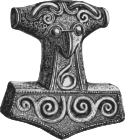- Midgard
-
 The runes a:miþkarþi for Old Norse à Miðgarði meaning "in Midgard" - "in Middle Earth", on the Fyrby Runestone (Sö 56) in Södermanland, Sweden.
The runes a:miþkarþi for Old Norse à Miðgarði meaning "in Midgard" - "in Middle Earth", on the Fyrby Runestone (Sö 56) in Södermanland, Sweden.
Midgard (an Anglicised[1] form of Old Norse Miðgarðr) is one of the Nine Worlds and is an old Germanic name for our world and is the home of Humans, with the literal meaning "middle enclosure".
Contents
Etymology
This name is attested in many ancient Germanic languages. It occurs in Old Norse literature as Miðgarðr. In Old High German poem Muspilli it appears as Mittilagart. The Gothic form Midjungards is attested in Luke's Gospel as a translation of the Greek word οἰκουμένη. The word is present in Old English epic and poetry as Middangeard; later transformed to Middellærd or Mittelerde ("Middle-earth") in Middle English literature.
All these forms are from a conjectural Proto-Germanic *medja-gardaz (*meddila-, *medjan-). Even if the two terms derive from Indo-European roots *medhyo ("middle") and *ghartos ("enclosure"), the construct exists only in Germanic. It's possible to speculate about the ancientness of this cosmological concept, but it may be inappropriate to trace back the Germanic terminology in common Indo-European.[citation needed]
The Danish and Swedish form Midgård or Midgaard, the Norwegian Midgard or Midgård, as well as the Icelandic form Miðgarður, all derive from the Old Norse term.
Old Norse
Midgard is a realm in Norse mythology. Pictured as placed somewhere in the middle of Yggdrasil, Midgard is surrounded by a world of water, or ocean, that is impassable. The ocean is inhabited by the great sea serpent Jörmungandr (Miðgarðsormr), who is so huge that he encircles the world entirely, grasping his own tail. The concept is similar to that of the Ouroboros.
In Norse mythology, Miðgarðr became applied to the wall around the world that the gods constructed from the eyebrows of the giant Ymir as a defence against the Jotuns who lived in Jotunheim, west of Mannheim, "the home of men," a word used to refer to the entire world.
The realm was said to have been formed from the flesh and blood of Ymir, his flesh constituting the land and his blood the oceans, and was connected to Asgard by the Bifröst, guarded by Heimdallr.
According to the Eddas, Midgard will be destroyed at Ragnarök, the battle at the end of the world. Jörmungandr will arise from the ocean, poisoning the land and sea with his venom and causing the sea to rear up and lash against the land. The final battle will take place on the plain of Vígríðr, following which Midgard and almost all life on it will be destroyed, with the earth sinking into the sea, only to rise again, fertile and green.
Although most surviving instances of the word refer to spiritual matters, it was also used in more mundane situations, as in the Viking Age runestone poem from the inscription Sö 56 from Fyrby:
- Iak væit Hastæin
- þa Holmstæin brøðr,
- mænnr rynasta
- a Miðgarði,
- sattu stæin
- ok stafa marga
- æftiR Frøystæin,
- faður sinn.[2]
- I know Hásteinn
- Holmsteinns brother,
- the most rune-skilled
- men in Middle Earth,
- placed a stone
- and many letters
- in memory of Freysteinn,
- their father.
Old and Middle English
The name middangeard occurs half a dozen times in the Old English epic poem Beowulf, and is the same word as Midgard in Old Norse. The term is equivalent in meaning to the Greek term Oikoumene, as referring to the known and inhabited world.
The concept of Midgard occurs many times in Middle English. The association with earth (OE eorðe) in Middle English middellærd, middelerde is by popular etymology; the continuation of geard "enclosure" is yard. An early example of this transformation is from the Ormulum:
-
- þatt ure Drihhtin wollde / ben borenn i þiss middellærd
-
- that our Lord wanted / be born in this middle-earth.
The usage of "Middle-earth" as a name for a setting was popularized by Old English scholar J. R. R. Tolkien in his The Lord of the Rings and other fantasy works; he was originally inspired by the references to middangeard and Éarendel in the Old English poem Crist.
Old High German
Mittilagart is mentioned in the 9th century Old High German Muspilli (v. 54) meaning "the world" as opposed to the sea and the heavens:
-
- muor varsuuilhit sih, suilizot lougiu der himil,
- mano uallit, prinnit mittilagart
-
- Sea is swallowed, flaming burn the heavens,
- Moon falls, Midgard burns
References
- ^ Online Etymology Dictionary
- ^ See also Skaldic Poetry of the Scandinavian Middle Ages for a version in normalized Old Norse orthography.
Anglo-Saxon paganism and mythology Gods and divine figures Heroic figures Other beings Locations Middangeard • NeorxnawangSources Origins Society and culture Neopagan revival Personifications and cosmology in Norse mythology Astronomical bodies Sun: (Sól · Árvakr and Alsviðr) · Moon: (Máni · Hjúki and Bil) · Earth: (Jörð · Fjörgyn and Fjörgynn) · Aurvandil
Time Worlds Nine Worlds: (Álfheimr · Asgard · Svartálfaheimr · Midgard · Múspellsheimr · Niðavellir · Niflheim · Jötunheimr · Vanaheimr) · Connected by the tree YggdrasilOther Norse paganism Deities,
heroes,
and figuresOthersAsk and Embla · Dís (Norns · Valkyries) · Dwarf · Einherjar · Elves (Light elves · Dark elves) · Fenrir · Hel · Jörmungandr · Jötunn · Sigurd · Völundr · Vættir
Locations Asgard · Bifröst · Fólkvangr · Ginnungagap · Hel · Jötunheimr · Midgard · Múspellsheimr · Niflheim · Valhalla · Vígríðr · Wells (Mímisbrunnr · Hvergelmir · Urðarbrunnr) · YggdrasilEvents Sources Society See also Categories:- Locations in Norse mythology
Wikimedia Foundation. 2010.

